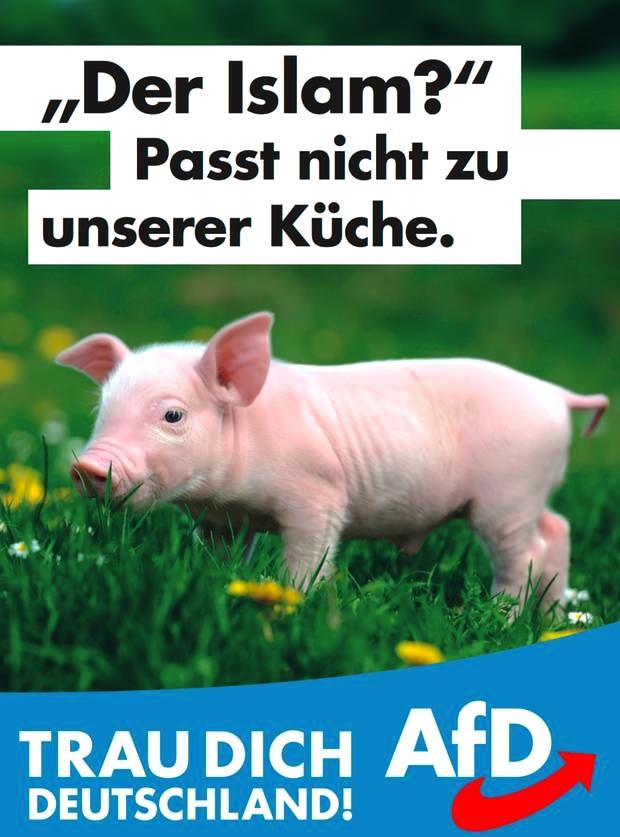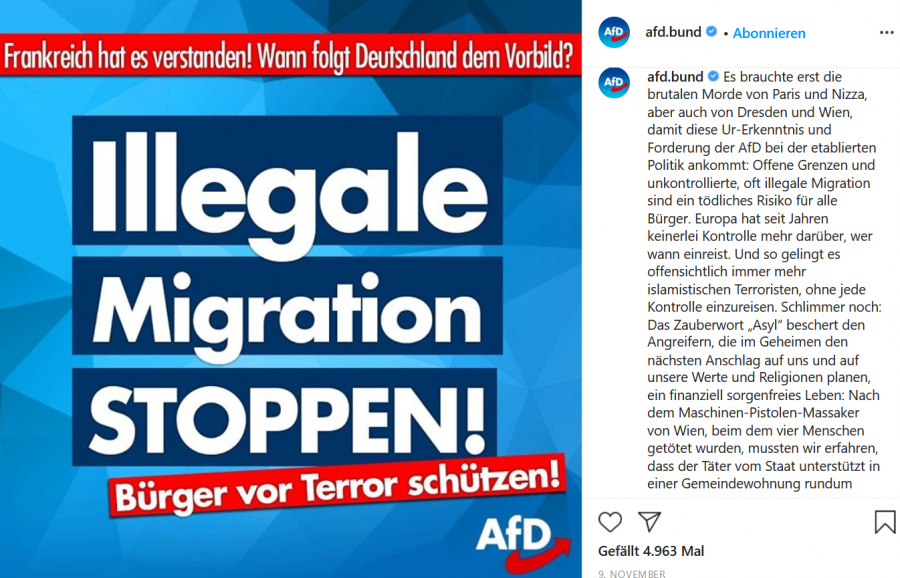
How the AFD tries to divide Germany
This article provides an analysis of the anti-migration politics of the German far-right party Alternative für Deutschland (AFD - Alternative for Germany). Its focus will be on the AFD's neo-racism and banal nationalism. It will furthermore examine how the AFD utilizes its political power to construct social groups and create an exclusion of foreigners from German culture by labeling them as deviant. Finally, methods used by the AFD to portray migrants as incompatible with German culture and a threat to the German nation will be analyzed.
AFD's neo-racism
The data that will be analyzed in this article is representative of Etienne Balibar's (2011) argument that racism has evolved. Biological racism, based on myths and pseudo-scientific theories, has developed into sociological racism. Pierre-Andrée Taguieff (1985) defines this new form of racism as ‘differential racism’. It is rooted in the recognition and acceptance of the diversity and equality of cultures. However, it is characterized by the belief in "insurmountable cultural differences". Hence, the main driving force of neo-racism is not of a biological nature anymore but anchored in the conviction that different cultures are incompatible due to differential traditions, values, and lifestyles. Furthermore, differential racism argues for the inevitable fixity of all cultures. Additionally, it is grounded in the ideology of homogenism (Balibar, 2011).
Thus, the essence of neo-racism is labeling people with a different cultural or ethnic background as deviant and therefore as 'outsiders', as Howard Becker would call it (Becker, 1953). Therefore, deviance is instrumentalized as a legitimization for exclusion.
From the following data, it is evident that the AFD propagates the elaborated neo-racism.

Figure 1 AFD election poster: "Islam?" Does not fit to our cuisine. I dare you Germany!
Figure 1 is an election campaign poster of the AFD that shows the image of a piglet. On the top of the poster, one can read "Islam? Does not fit our cuisine". The appeal "I dare you, Germany!" is located at the bottom of the poster in the party's colors blue and white next to the party's logo consisting of the abbreviation "AFD" over a red arrow pointing to the upper right.
Howard Becker (1953) states that group constructions and normality are always linked to power and ideologies. This phenomenon is shown in Figure 1. The right party's deliberate choice of words "Islam? Does not fit our cuisine" in connection to the picture of the piglet strategically emphasizes the differences between the behavior and traditions of Christian Germans and Islamic foreigners. This constitutes an 'us versus them' division which is even more indicated by the word "we" (unsere in the campaign poster) which divides two groups. On the one side, the AFD portrays "we" as the Germans that value eating pork since it is a traditional dish in German cuisine. And on the other side, "them" as Muslim foreigners that are not allowed to eat pork due to the rules and traditions of their religion.
Moreover, AFD's neo-racism is obviously detected in the meaning behind the sentence "Islam? Does not fit our cuisine". The party states that the German culture is not compatible with cultures that are embossed by a different religion, values, traditions, and rules that affect one's lifestyle and behavior - including eating habits. Furthermore, the appeal "I dare you, Germany!" shows that the poster of the party has the function to incite viewers against the mixing of cultures through migration. This shows that the AFD considers a homogenous society as the norm. By constructing two different groups, the party defines migration as abnormal and migrants, in Becker's words, as 'deviant' and 'outsiders' who do not fit or belong to the German culture.

Figure 2 AFD election poster: "Burkas?" We like bikinis. I dare you Germany!
The election campaign poster in Figure 2 shows three white-skinned, western-looking women walking on the beach in bikinis. The slogan on the top of the poster says "Burkas? We like bikinis." and on the bottom of the poster, there is the appeal "I dare you, Germany!" next to the AFD logo.
Once again the party expresses differences between Germans and Muslim-influenced immigrants as the phrase "Burkas? We like bikinis", clearly displays. The word "we" again indicates, that the AFD distinguishes two groups; "we", Germans of free body culture and "them", Muslims who cover their bodies because of their religion. The picture can be understood as a reflection of the western way of dressing which is embodied by self-determination and independence. The slogan of the AFD puts this into contrast to Burkas which are full-body covering veils, understood by the AFD as a symbol of female oppression and sexism. Thus, the AFD again denounces that different cultural values collide and cannot coexist in one country due to conflicting lifestyles and traditions.
Likewise, the AFD poster claims, that Muslim migrants threaten the equality of men and women because of dissimilar traditions and values. Consequently, they construct a picture of migrants, especially those who do not assimilate into German culture, as enemies of Germany and the Germans. This is, inter alia, mirrored in the intentions of the AFD to forbid Burkas and Hijabs in Germany.

Figure 3 AFD Bremen online campaign: the islamization is continuing. Social flashpoint Hemelingen. No mosques in our city!
The online campaign of AFD Bremen (Figure 3) shows the image of a mosque. The phrase "Islamization continues" is at the top of the poster while the demand "No mosques in our city!" is in the center. At the bottom left, a red box says "social flashpoint Hemelingen". Underneath that one can read "AFD Bremen" next to the logo of the party. Also here, the poster is kept in the blue-white-red color scheme of the party.
As already shown in Figures 1 and 2, the word choice of the AFD generates a “we” versus “them” mentality as it points out religious differences between Germans on the one side and Muslims on the other. Additionally, the command "no mosques in our city" defines group relations from a neo-racist perspective: people who are born and raised in Germany feel like owners of Germany ("our city") and more entitled to the country than migrants. Hence, the AFD supports old traditions like Christianity and rejects the influence of different cultural expressions such as mosques that represent Islam. By describing the city part Hemelingen, which is the home of many migrants, as a "social flashpoint" the AFD indicates that foreigners are the reason for socially and economically weak developed areas of Bremen. Thus they strategically construct migrants as the enemy to German society.
It becomes obvious that the AFD divides the nation on the basis of different traditions, values, and lifestyles and states that otherness is not compatible with German culture and society.
It becomes obvious that the AFD divides the nation on the basis of different traditions, values, and lifestyles and states that otherness is not compatible with German culture and society. The selected data illustrates this in the fields of eating habits (Figure 1), way of dressing (Figure 2), and religion (Figure 3). Hence, the AFD makes use of what Balibar (1991) defines as neo-racism to promote xenophobia and Islamophobia.
Figure 4 Best of AFD hate edition
Furthermore, AFD's neo-racist nature is depicted even more drastically in the speech snippets of Figure 4. The AFD chairman Alexander Gauland for instance claims the German nation would “die out” because of migration. His ideologies demonstrate a good example of the phenomenon of neo-racism since the connected 'differential racism’ is based on the theory that mixing cultures and nations results in the "intellectual death of humanity" (Balibar, 1991).
This example underlines that the spread of fear towards the diverse and the other is a significant element of far-right hate speech. Additionally, Gauland emphasizes the 'need' to preserve the German culture and national identity that is manifested in his right ideology of homogenism. Following, the politician appeals to the audience and warns of a "race-exchange caused by migration" (Figure 4). Consequently, Gauland makes use of the phenomenon of global diversification to promote neo-racism; he segregates socially constructed groups based on their culture, norms, and values.

Figure 5 AFD Instagram post, France understood it! When is Germany following the example? Stop illegal migration! Protect citicents from terror!
The social media post shown in Figure 5 is kept in the party colors blue, white and red. The sentence "Stop illegal migration!" is in the center of the picture. At the top of the post, one can read "France understood it! When is Germany following the example?" while the red box at the bottom of the picture demands "Protect citizens from terror!".
The Instagram post clearly shows that the AFD's separation of Germans and migrants is a central strategy in promoting xenophobia. Moreover, it reveals that generalization is an additional approach to influence people in the way that they perceive socially constructed phenomena like race and identity. The sentence "Stop illegal migration!" in relation to the appeal "Protect citizens from terror!" implicates that migration is causally linked to terrorism which German citizens need to fear and be protected from. Consequently, the AFD creates a 'perpetrator - victim' construct that demarcates migrants as dangerous. This generalization of individuals within a certain group again intends to create fear and rejection towards the image of the enemy that is constructed.
Moreover, the AFD refers to French migration politics as a positive example in order to normalize the racist mentality they transport. Another aspect of their manipulation is the dehumanization of migrants. The AFD downplays that refugees are human beings of equal value like everyone else and highlight racist propaganda that portrays them as an endangering phenomenon, not as individual lives.
AFD's banal nationalism
Besides neo-racism, the AFD also makes use of banal nationalism in the discourse of their anti-migration politics.
In order to connect political strategies from the AFD with banal nationalism, the term has to be further elaborated. Michael Billig (1995) describes banal nationalism as a hegemonic form of nationalism based on a sense of belonging and tribalism through national identity. Banal nationalism differs from nationalism expressed through 'flag-waving extremists' in the sense that it is a rather subtle form; through often unnoticed ways and routines the nation is indicated in the daily lives of its citizens. The flagging and reminding of nationhood form a national identity which can be seen in the habits of social life. Telling examples for this are national anthems and the use of flags in the everyday context (Billig, 1995).
At a demonstration in Erfurt in 2015 (Figure 4), the AFD politician Markus Flohnmaier states: “We are the nation. It is time to make politics for us, the nation again”. Putting this into the context of mass migration because of the refugee crisis in 2015, it becomes clear that Flohnmaier makes use of diversification to promote nationalism. His strategic choice of words such as "we are the nation" and "for us, the nation" strengthens the audience's awareness of the German identity and constructs a sense of belonging through national identity to strengthen the group from within. However, this constructed inclusion simultaneously means the exclusion of 'outsiders', the migrants.
Hence, Flohnmaier emphasizes the distinction made by the AFD between the 'German identity' and the 'other'. Central in his hate speech is the cohesion of the 'German nation' against the 'deviant migrants'. Flohnmaier makes use of manipulative language to remind the audience of their nationhood and communicates a sense of belonging in a subtle manner. Additionally, a German flag is located around the lectern during his speech to remind the audience of his and their nationhood.
The posters promote nationalism as they present the ideology of homogenism and Germany's values, traditions, and norms to function as a reminder of nationhood.
Also, Figures 1, 2, and 3 reveal the banal nationalism of the AFD since the election posters hanging in the city indicate the nation's traditions during the daily lives of the citizens. Moreover, the posters promote nationalism as they present the ideology of homogenism and Germany's values, traditions, and norms to function as a reminder of nationhood.
Finally, Billig emphasizes that banality is not to be confused with harmlessness due to the fact that daily banal nationalism can be the fundament of radical nationalism (Billig, 1995). Exactly that is the reason, why the AFD should be considered dangerous; the party itself and its supporters can radicalize in far-right ideologies.
The anti-migration politics of the AFD
The analysis of the far-right political party Alternative for Germany revealed how the AFD instrumentalizes neo-racism and banal nationalism to spread Islamophobia as well as xenophobia in Germany by zooming in on various examples. These examples range from election campaign posters over social media posts on Instagram to video material of politician's quotes.
What the analyzed data has in common is the racist nature of the delivered message. It has become obvious, that the AFD tries to divide the German nation by excluding migrants from German culture by constructing them as deviant on the basis of differential traditions, norms, values, and lifestyles that are, in their opinion, incompatible with the German nation. Furthermore, it is illustrated that the politicians of the AFD spread fear towards diversity and the 'otherness' of migrants in order to portray them as dangerous. The promotion of nationalism is an additional tool in trying to divide Germany.
Finally, it has to be emphasized that the AFD with its strategic use of neo-racism and banal nationalism has the power to negatively aggravate the political and social climate in Germany because of their political power within the parliament. Consequently, the AFD has to be categorized as highly dangerous due to its spreading of racist, nationalist, and intolerant ideologies as well as its high potential for radicalization.
References
Balibar, E. (2011). Is there a 'neo-racism'. in Balibar, E., & Wallerstein, I. (2011). Race, Nation, Class: Ambiguous Identities (Radical Thinkers) (Second Edition). Verso. pp. 17-28
Balibar, E., & Wallerstein, I. (2011). Race, Nation, Class: Ambiguous Identities (Radical Thinkers) (Second Edition). Verso.
Becker, H. S. (1966). Outsiders, Studies in the Sociology of Deviance. (reprint edition). The Free Press.
Billig, M. (1995). Banal Nationalism (Theory, Culture and Society) (1st ed.). SAGE Publications Ltd.
Deutsche Welle (www.dw.com). (2017, May 27). AfD wants ban on wearing a headscarf in street. DW.COM.
Deutsche Welle (www.dw.com). (2019, October 28). Things you need to know about the AfD. DW.COM.
Taguieff, (1985). L'Identité française au miroir du racisme différentialiste, Espaces 89, L'identité française, edition Tierce, Paris.